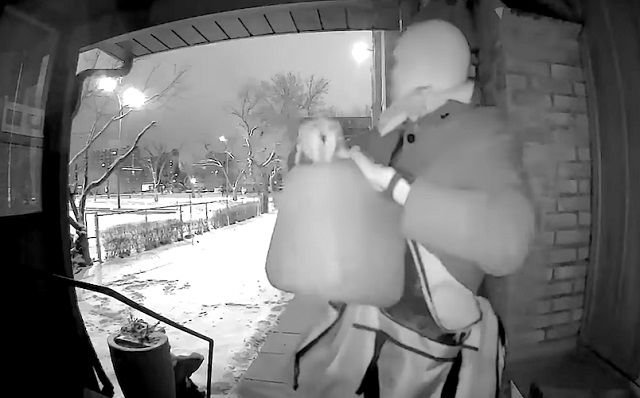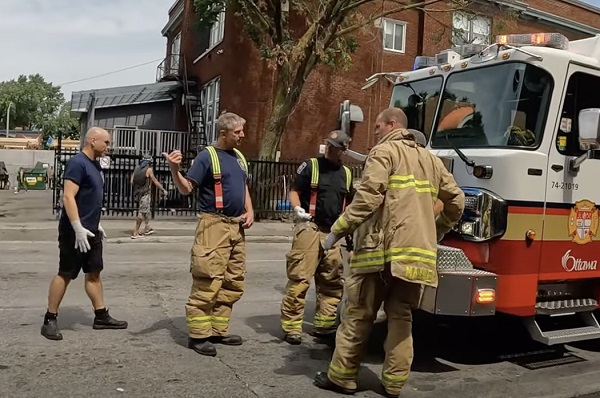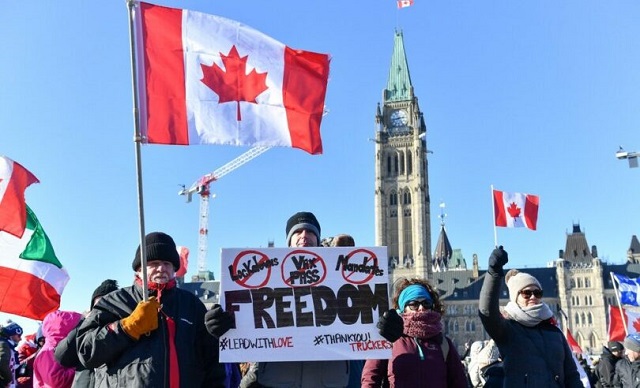Crime
Alberta RCMP celebrate a one-of-a-kind partnership with their Police Service Dogs

Aug. 21, 2019
Alberta RCMP celebrate a one-of-a-kind partnership with their Police Service Dogs
Edmonton – In recognition of International Dog Day on Monday, Aug. 26, 2019, Alberta RCMP’s Police Dog Services Unit provided a demonstration of their abilities in tacking illicit substances, explosive materials and suspects through adverse conditions.
Police Dog Services Unit handlers Sgt. Troy Raddatz, Cpl. Andy Brown and Cpl. Mike Drenka, with Police Service Dogs Hulk, Echo and Roy showed-off their skills and took questions from the assembled media.
Quotes
“Hulk is the hardest working and most reliable partner I could ever hope to have, but he’s more than that. He’s also a loving member of our family.”
– Sgt. Troy Raddatz
Police Dog Services Program Manager
“K” Division RCMP“I’m very lucky to be partnered with Roy. Our personalities are one in the same. While we both enjoy our backyard leisure time with the family, we can quickly and effectively head off at a moments notice to assist frontline members, whether it be locating a missing person, or apprehending a wanted criminal. I can’t think of another dog, or even person I would rather work with, day in and day out.”
– Cpl. Mike Drenka
“K” Division RCMP Dog Handler“The bond between a dog and their handler is unlike any other relationship. You spend so much time together, constantly at work, training and on your days off, your dog becomes a part of your family. The biggest part of a team’s ability to succeed in the field relies heavily on this bond.”
– Cpl. Andy Brown
“K” Division RCMP Dog Handler
Quick Facts
All RCMP working dogs are purebred German Shepherds that are bred, born and trained in Innisfail, Alta. at the Police Dog Service Training Centre.On average, the Centre will whelp 100 healthy puppies every year.
The responsibilities of police services dogs include locating lost persons; tracking criminals; searching for narcotics, explosives, human remains, crime scene evidence and lost property; VIP protection; crowd control, in conjunction with tactical troop; hostage situations; avalanche search and rescue; and police/community relations.
Currently, there are 19 dogs in “K” Division.

Backgrounder: Police Dog Services
History
From 1908 to 1935 members occasionally used privately owned dogs to assist them in their investigations.
The RCMP dog section was formed in 1935 with the acquisition of three German shepherds.
In 1937, the Commissioner at the time ordered an RCMP training school for dogs and handlers to be established in Calgary.
The RCMP Police Dog Service Training Centre was established in Innisfail, Alta. in 1965.
Dogs
All RCMP working dogs are purebred German Shepherds that are bred, born and trained in Innisfail at the Police Dog Service Training Centre. On average, the Centre will whelp 100 healthy puppies every year.
At 7 weeks of age, puppies are put through a structured evaluation. Only those that display the unique qualities of an RCMP working dog will go forward into the Imprinting Program.
The RCMP Imprinting Program develops puppies and young dogs in preparing them to be successful for their eventual police service dog training.
Imprinters are RCMP members located across Canada, who have career aspirations of becoming a dog handler. They volunteer hundreds of hours every year ensuring our puppies become socialized and confident.
Continuous testing and monitoring is performed throughout the Imprinting phase. Once the dog is 14-16 months old, it will be evaluated for his/her suitability to come into formal training. Basic training is approximately 17 weeks.
Dogs and handlers are validated to the Doghandler Course Training Standard Field Level capability annually.
In addition to training, the Police Dog Service Training Centre also, breeds and sells dogs.
Dog Handlers
Dog handlers are regular members who volunteer for this particular duty.
Candidates must go through a staffing selection process, which involves meeting certain criteria.
Duties
The responsibilities of police services dogs include locating lost persons; tracking criminals; searching for narcotics, explosives, human remains, crime scene evidence and lost property; VIP protection; crowd control, in conjunction with tactical troop; hostage situations; avalanche search and rescue; and police/community relations.
Currently, there are 19 dogs in K Division.
Crime
Canadian receives one-year jail sentence, lifetime firearms ban for setting church on fire

From LifeSiteNews
Jordan Willet was convicted of starting a blaze in February at Blessed Sacrament Parish in Regina, Saskatchewan.
A man who was charged with arson after trying to burn down a historic Catholic church earlier this year was handed only a one-year jail sentence for his crime but has also been banned from being able to possess firearms for life.
On April 9, a court sentenced Jordan Willet, 31, to 278 days in jail for intentionally or recklessly causing damage by fire or explosion to property and for not complying with a probation order. In February, LifeSiteNews reported that Willet had been arrested and charged with starting a fire at Blessed Sacrament Parish in Regina, Saskatchewan, on February 9.
He pleaded guilty to both charges and also received an 18-month probation sentence along with a lifetime firearm prohibition.
Over the weekend, Fr. James Hentges, the parish pastor, said he was “relieved he is in custody and is not a threat.”
The parish had posted footage of the February 9 attack on social media and put out a plea for anyone who had information on the event to report it to police.
The video footage of the attack, taken from a doorbell camera, shows Willet, in a mask, pouring fuel on the church before setting it on fire.
Fire investigators determined that the blaze was caused by a direct act of arson.
Since the spring of 2021, more than 100 churches, most of them Catholic, have been burned or vandalized across Canada. The attacks on the churches came shortly after the unconfirmed discovery of “unmarked graves” at now-closed residential schools once run by the Church in parts of the country.
In 2021 and 2022, the mainstream media ran with inflammatory and dubious claims that hundreds of children were buried and disregarded by Catholic priests and nuns who ran some of the schools.
Despite the church burnings, the federal government under Prime Minister Justin Trudeau has done nothing substantial to bring those responsible to justice or to stem the root cause of the burnings.
The claims, which were promoted by Trudeau among others, lack any physical evidence and were based solely on soil disturbances found via ground-penetrating radar.
In fact, in August 2023, one such site underwent a four-week excavation and yielded no remains.
Despite the lack of evidence, the Canadian Broadcasting Corporation (CBC) and others have continued to push the narrative, even running a report recently that appeared to justify the dozens of attacks against Catholic churches.
In January, Conservative Party leader Pierre Poilievre not only condemned the rash of church burnings in Canada but called out Trudeau for being silent on the matter.
Addictions
Liberal MP blasts Trudeau-backed ‘safe supply’ drug programs, linking them to ‘chaos’ in cities

First responders in Ottawa dealing with a crisis Fridayman 0102 / YouTube
From LifeSiteNews
‘There is certainly the perception by a lot of Canadians that a lot of downtown cores are basically out of control,’ Liberal MP Dr. Marcus Powlowski said, before pointing specifically to ‘safe supply’ drugs and injection sites.
A Liberal MP has seemingly taken issue with “safe supply” drug policies for increasing public disorder in Canada, policies his own party, under the leadership of Prime Minister Justin Trudeau, has endorsed.
During an April 15 health committee meeting in the House of Commons, Liberal MP Dr. Marcus Powlowski, while pressing the Royal Canadian Mounted Police (RCMP), stated that “safe supply” drug policies have caused Canadians to feel unsafe in downtown Ottawa and in other major cities across the country.
“There is certainly the perception by a lot of Canadians that a lot of downtown cores are basically out of control,” Powlowski said.
“Certainly there is also the perception that around places like safe supply, safe injection sites, that things are worse, that there are people openly stoned in the street,” he continued.
“People are getting cardio-pulmonary resuscitation performed on them in the street. There are needles around on the street. There is excrement on the street,” Powlowski added.
“Safe supply“ is the term used to refer to government-prescribed drugs that are given to addicts under the assumption that a more controlled batch of narcotics reduces the risk of overdose – critics of the policy argue that giving addicts drugs only enables their behavior, puts the public at risk, disincentivizes recovery from addiction and has not reduced, and sometimes even increased, overdose deaths where implemented.
Powlowski, who has worked as an emergency room physician, also stated that violence from drug users has become a problem in Ottawa, especially in areas near so-called “safe supply” drug sites which operate within blocks of Parliament Hill.
“A few months ago I was downtown in a bar here in Ottawa, not that I do that very often, but a couple of colleagues I met up with, one was assaulted as he was going to the bar, another one was threatened,” said Powlowski.
“Within a month of that I was returning down Wellington Street from downtown, the Rideau Centre, and my son who is 15 was coming after me,” he continued. “It was nighttime and there was someone out in the middle of the street, yelling and screaming, accosting cars.”
Liberal MP Dr. Brendan Hanley, the Yukon’s former chief medical officer, testified in support of Powlowski, saying, “My colleague Dr. Powlowski described what it’s like to walk around downtown Ottawa here, and certainly when I walk home every day, I encounter similar circumstances.”
“Do you agree this is a problem?” Powlowski pressed RCMP deputy commissioner Dwayne McDonald. “Do you agree for a lot of Canadians who are not involved with drugs, that they are increasingly unhappy with society in downtown cores which are this way? Do you want to do more about this, and if you do want to do more about this, what do you need?”
McDonald acknowledged the issue but failed to offer a solution, responding, “One of the success factors required for decriminalization is public support.”
“I think when you are faced with situations where, as we have experienced in our communities and we hear from our communities, where public consumption in some places may lead to other members of the public feeling at risk or threatened or vulnerable to street level crime, it does present a challenge,” he continued.
Deaths from drug overdoses in Canada have gone through the roof in recent years, particularly in British Columbia after Trudeau’s federal government effectively decriminalized hard drugs in the province.
Under the policy, which launched in early 2023, the federal government began allowing people within the province to possess up to 2.5 grams of hard drugs without criminal penalty, but selling drugs remained a crime.
The policy has been widely criticized, especially after it was found that the province broke three different drug-related overdose records in the first month the new law was in effect.
The effects of decriminalizing hard drugs in various parts of Canada has been exposed in Aaron Gunn’s recent documentary, Canada is Dying, and in U.K. Telegraph journalist Steven Edginton’s mini-documentary, Canada’s Woke Nightmare: A Warning to the West.
Gunn says he documents the “general societal chaos and explosion of drug use in every major Canadian city.”
“Overdose deaths are up 1,000 percent in the last 10 years,” he said in his film, adding that “[e]very day in Vancouver four people are randomly attacked.”
-

 Economy1 day ago
Economy1 day agoExtreme Weather and Climate Change
-

 International1 day ago
International1 day agoTelegram founder tells Tucker Carlson that US intel agents tried to spy on user messages
-

 Business1 day ago
Business1 day agoNew capital gains hike won’t work as claimed but will harm the economy
-

 Alberta2 days ago
Alberta2 days agoDanielle Smith warns arsonists who start wildfires in Alberta that they will be held accountable
-

 National2 days ago
National2 days agoCanada’s Governor General slammed for hosting partisan event promoting Trudeau’s ‘hate speech’ bill
-

 Bruce Dowbiggin1 day ago
Bruce Dowbiggin1 day agoWhy Are Canadian Mayors So Far Left And Out Of Touch?
-

 Justice1 day ago
Justice1 day agoOntario Court of Justice says participants must state their ‘preferred pronouns’ during introduction
-

 Business1 day ago
Business1 day agoTrudeau gov’t pledges $42 million to the CBC to promote ‘independent journalism’








